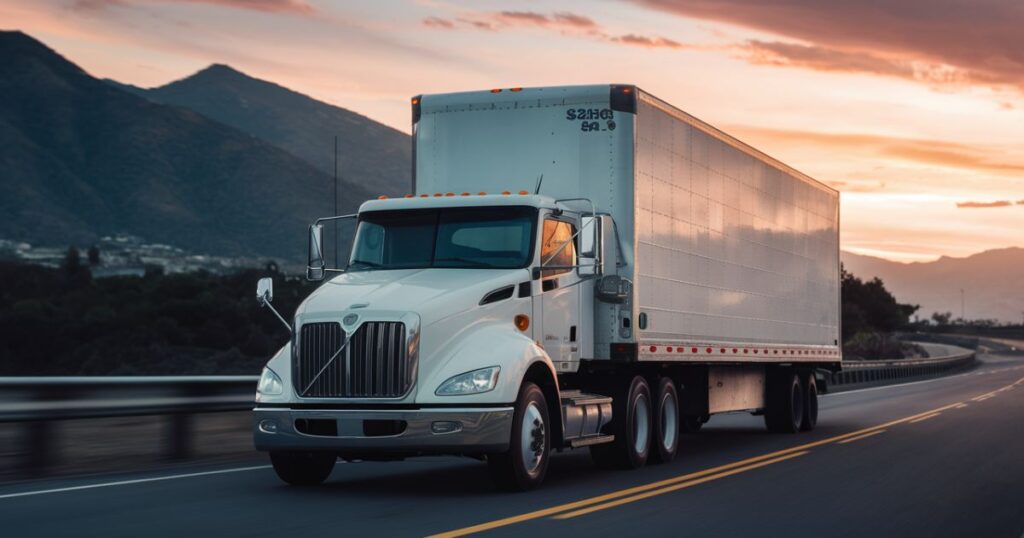A box truck business involves using medium-sized trucks with cuboid storage areas for freight transportation. These vehicles are ideal for local and regional deliveries, offering a balance between cargo capacity and urban maneuverability.
Are you looking to enter the transportation industry with lower barriers? Learning how to start a box truck business? could be your ticket to entrepreneurial success. This venture offers flexibility, lower startup costs compared to semi-trucks, and doesn’t always require a commercial driver’s license.
Box truck businesses cater to a growing demand for smaller deliveries, especially with the e-commerce boom. They can handle diverse cargo types, from furniture to parcels, and operate in both urban and rural areas. With proper planning and management, a box truck business can be a profitable enterprise.
What is a box truck?
A box truck is a medium-sized commercial vehicle with a cube-shaped cargo area attached to the cab. It’s larger than a van but smaller than a semi-truck, typically ranging from 10,000 to 26,000 pounds. These trucks are versatile for local and regional deliveries, offering a good balance of storage space and urban maneuverability.
Box trucks are popular in industries like moving, e-commerce, and local freight. They don’t usually require a commercial driver’s license to operate, making them accessible to many entrepreneurs. The enclosed cargo area protects goods from weather and provides security, making box trucks a practical choice for various business needs.
Why start a box truck business?

Starting a box truck business can be an attractive option for entrepreneurs looking to enter the transportation industry. It requires less initial investment than larger trucking operations and doesn’t usually need a commercial driver’s license. This lower barrier to entry makes it accessible to a wider range of people.
Box truck businesses are in high demand due to the growth of e-commerce and local delivery needs. They offer flexibility, allowing you to start small as a solo operator and potentially expand into a larger fleet. With careful planning and hard work, it can be a profitable venture in today’s logistics-driven market.
Read More : How to Start a Lawn Care Business Legally: 10 Steps to Success
Steps for starting your box truck business
Here are some steps to help you start a box truck business.
1. Start your business on paper.
You need to register your box truck business with the government before you can start. Here are some tasks you need to do to get your business up and running:
Choose a legal structure.
Choosing a legal structure is a key step in starting your box truck business. While you can operate as a sole proprietor, forming an LLC or corporation is often smarter. These structures protect your personal assets and may offer tax benefits. Consider your long-term goals when deciding.
File for an Employer Identification Number (EIN).
To start your box truck business, you’ll need an Employer Identification Number (EIN). This is like a social security number for your company. You can get it online through the IRS website. It’s free and quick. You’ll use this number for taxes and other business matters.
Sign up with the FMCSA.
To operate across state lines, you’ll need to register with the FMCSA. This involves getting a DOT and MC number. There’s a $300 fee for your operating authority. You’ll also need insurance and a BOC-3 filing. Check the FMCSA website to see if you need a DOT number and for registration links.
2. Set up a business checking account.

Setting up a business checking account is crucial when starting a box truck business. It helps you keep personal and business finances separate, which is important for accounting and taxes. Most banks offer business accounts, so shop around for the best terms and features that suit your needs.
To open an account, you’ll typically need your business registration documents, tax ID, and initial deposit. Consider getting a business credit card too. This can help build your company’s credit history, which may be useful for future financing needs like truck purchases or upgrades.
3. Acquire your box truck, insurance, and related equipment.
Getting your box truck is a crucial step in starting your business. You have three main options: renting, leasing, or buying. Renting is good for short-term needs but can be expensive. Leasing requires less upfront cash than buying but involves ongoing payments. Buying gives you full ownership but needs more initial investment.
Don’t forget about insurance – it’s a must-have for your business. Look into commercial truck insurance providers like Progressive or Freeway. They can help protect your business from accidents and liability issues. Make sure to shop around for the best rates and coverage for your specific needs.
Lastly, consider the equipment you’ll need for loading and unloading. A pallet jack is useful if you’ll be handling pallets. You’ll also want straps or other gear to secure loads in your truck. Having the right tools will make your job easier and help keep your cargo safe during transport.
4. Find work
Finding work is crucial for your new box truck business. Start by signing up for load boards like Landstar or DAT. These online marketplaces connect carriers with available freight. Filter for box truck-specific jobs to find suitable loads. Amazon Relay is another great option, focusing on Amazon logistics opportunities.
Consider using an electronic logging device (ELD) with spot freight features. While not always required for box trucks, these systems can help you find work on the go. They match your location with nearby available jobs, similar to how rideshare apps work for drivers.
For more stable income, look into securing contracts. Reach out to freight brokers directly or explore local matching sites like GoShare or Lugg. Government contracts can be a good option, especially for minority-owned businesses. Building relationships with brokers and shippers can lead to regular, long-term work for your box truck business.
Side note: how to get contracts for a box truck
You can find long-term stable work with a box truck. It might not pay as much as spot rates, but it offers more long-term benefits for your business. Here are some ways to get contracts:
- Use Load Boards: Load boards can connect you with brokers. If you build good relationships, this can lead to long-term work.
- Contact Freight Brokers Directly: If you know any brokers, ask them if they have contracts available for box trucks.
- Amazon Relay: To sign up with Amazon, you need DOT and MC numbers, authorization to hire, and a good safety rating.
- Local Matching Sites: Check out GoShare, Lugg, and Dolly for opportunities.
- Government Contracts: This is a great option for minority-owned businesses, but you will need your MBE certification first.
5. Maintain steady cash flow to grow (or maintain) your box truck business.

Running a box truck business involves constant expenses. You need to pay for fuel, truck payments or rentals, and insurance regularly. To keep your business going, you need a steady flow of cash. This can be tough, even if you have plenty of work.
The challenge is that many customers don’t pay right away. Some take 30 or even 60 days to pay your invoices. This delay can cause problems when you need money for immediate expenses. It’s hard to fill up your gas tank with the promise of future payment.
One solution is factoring. Factoring companies pay you upfront for your invoices, then collect from your customers later. They take a small fee, but it can be worth it to keep your cash flowing. Some companies, like Bobtail, offer easy-to-use apps for quick funding.
Conclusion
Starting a box truck business can be a great opportunity for entrepreneurs in the transportation industry. It offers a lower barrier to entry compared to larger trucking operations and can be profitable with proper planning and execution.
Success depends on managing your finances wisely, especially your cash flow. By using strategies like factoring and maintaining a steady stream of work, you can overcome common challenges and grow your business. With dedication and smart management, your box truck business can thrive in the expanding logistics market.
FAQs
Can you really make money with a box truck?
Yes, you can make money with a box truck. Profitable opportunities exist in local deliveries, moving services, and e-commerce logistics, especially with good planning and efficient operations.
How much does a box truck weigh?
Box trucks typically weigh between 10,001 and 26,000 pounds, falling into medium-duty truck classes 3 to 6. Some larger box trucks may weigh up to 33,000 pounds, entering the heavy-duty class 7 category.
How to start a trucking business in Texas?
To start a trucking business in Texas, register your business with the state, obtain a DOT number, secure proper insurance, acquire your truck(s), and comply with Texas-specific regulations. You’ll also need to set up business accounts and find clients.










